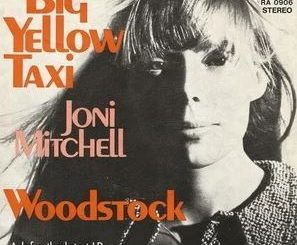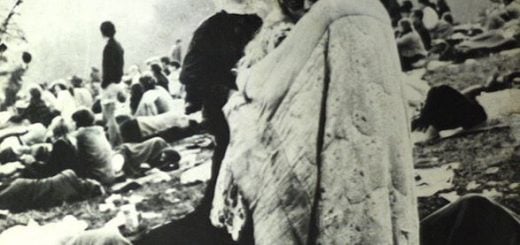Big Yellow Taxi by Joni Mitchell Lyrics Meaning – Paving Over Paradise: A Cautionary Tale of Progress
Lyrics
Put up a parking lot
With a pink hotel, a boutique
And a swinging hot spot
Don’t it always seem to go
That you don’t know what you’ve got ’til it’s gone?
They paved paradise
Put up a parking lot
Shoo, bop, bop, bop, bop
Shoo, bop, bop, bop, bop
They took all the trees
Put ’em in a tree museum
And they charged the people
A dollar and a half just to see ’em
Don’t it always seem to go
That you don’t know what you’ve got ’til it’s gone?
They paved paradise
Put up a parking lot
Shoo, bop, bop, bop, bop
Shoo, bop, bop, bop, bop
Hey, farmer, farmer
Put away the DDT now
Give me spots on my apples
But leave me the birds and the bees, please
Don’t it always seem to go
That you don’t know what you’ve got ’til it’s gone?
They paved paradise
Put up a parking lot
Shoo, bop, bop, bop, bop
Shoo, bop, bop, bop, bop
Late last night
I heard the screen door slam
And a big yellow taxi
Took away my old man
Don’t it always seem to go
That you don’t know what you’ve got ’til it’s gone?
They paved paradise
Put up a parking lot
Shoo, bop, bop, bop, bop
I said, don’t it always seem to go
That you don’t know what you’ve got ’til it’s gone
They paved paradise
Put up a parking lot
Shoo, bop, bop, bop, bop
They paved paradise
Put up a parking lot
Shoo, bop, bop, bop, bop
They paved paradise
Put up a parking lot
In 1970, Joni Mitchell released her ecological anthem, ‘Big Yellow Taxi,’ a song that has since become a clarion call for environmental awareness and conservation. With its catchy melody and playful ‘shoo, bop, bop’ backing vocals, the song masks a deeper message about the perils of unchecked progress and the loss of natural beauty.
Mitchell’s masterpiece has woven its way into popular culture, rapidly becoming an emblem of the rise in environmental consciousness during the late ’60s and early ’70s. Parsing the lyrical layers reveals a profound critique of human short-sightedness and the propensity to take the purity of nature for granted. She fuses social commentary with personal narrative seamlessly, leaving a tune that’s as poignant today as it was over half a century ago.
Unlocking the Verdant Verses: Paradise Lost to Progress
The opening lines, ‘They paved paradise, put up a parking lot,’ bluntly symbolize the destructive transformation of natural landscapes into sterile concrete expanses. Here, Mitchell doesn’t only lament the literal deforestation and urbanization. She’s also commenting on the wider loss of beauty, freedom, and connection to the earth—a move from an organic way of life to one that is inorganic and artificial.
Through her vivid imagery of a ‘pink hotel, a boutique, and a swinging hot spot,’ Mitchell critiques the commercialization that often accompanies ‘progress.’ The irony that it’s paradise itself being destroyed to create these spaces is not lost on the listener, cleverly captured in the sarcastic tone behind the catchy rhythm.
A Tree Museum and the Price of Nature
The powerful, ‘they took all the trees, put ’em in a tree museum, and they charged the people a dollar and a half just to see ’em,’ hits hard. What once was free and ubiquitous—nature in its purest form—has been removed, objectified, and sold back to the very people from whom it was taken. It’s a fierce critique of the commodification of nature.
Mitchell’s ‘tree museum’ is an authentic metaphor for the human tendency to destroy and then cling to the relics of what we’ve lost. It’s a warning that if we are not careful, all we will have left are echoes of the past, curated behind glass, rather than the living, breathing forests that once were.
The Environmental and Personal: DDT’s Legacy
The verse involving the farmer reveals Mitchell’s personal stake in the environmental conversation. The refrain, ‘Hey, farmer, farmer, put away the DDT now,’ was a topical response to the widespread use of the pesticide DDT, which, though effective in agriculture, had devastating impacts on wildlife, particularly birds. Mitchell’s plea for natural imperfection over harmful perfection resonates with a universal desire for a more holistic, sustainable way of life.
By invoking the ‘birds and the bees,’ she’s not just referencing ecosystem health, but also the foundational aspects of human existence, from natural food chains to human reproduction. Her song ties the personal to the global, showing that environmental issues infiltrate the most intimate corners of our lives.
Decoding the Departure: The Big Yellow Taxi’s Hidden Meanings
The ‘big yellow taxi’ serves as an enduring symbol within the song. In one layer, it could simply symbolize the removal of something cherished, reinforced by the sudden departure of her ‘old man.’ On another level, the taxi stands in for modernity’s trade-offs—gains in convenience often come with unforeseen costs.
Moreover, this vehicle of change, the taxi—synonymous with the human-made, the urban, and the disruptively mobile—serves as a counterpoint to the organic immobility of paradise. Yet its color, yellow, can symbolize both caution and treasured things (like gold or sunlight), adding depth to the metaphor.
The Unforgettable Chorus: A Universal Truth Through Repetition
It is the chorus, ‘Don’t it always seem to go, that you don’t know what you’ve got ’til it’s gone,’ that has reverberated through the generations, becoming almost proverbial in its delivery of universal truth. Simple yet profound, the lyric encapsulates the human condition—our knack for taking the extraordinary for granted until it’s irretrievably lost.
Mitchell’s incantation-like repetition of this line throughout the song, peppered with the hypnotic ‘shoo, bop, bop, bop, bop,’ ensures it’s not just heard, but felt. The repetition serves as a lament, a warning, and eventually, as an invocation for the listener to awaken to their surroundings and appreciate them before it’s too late.








